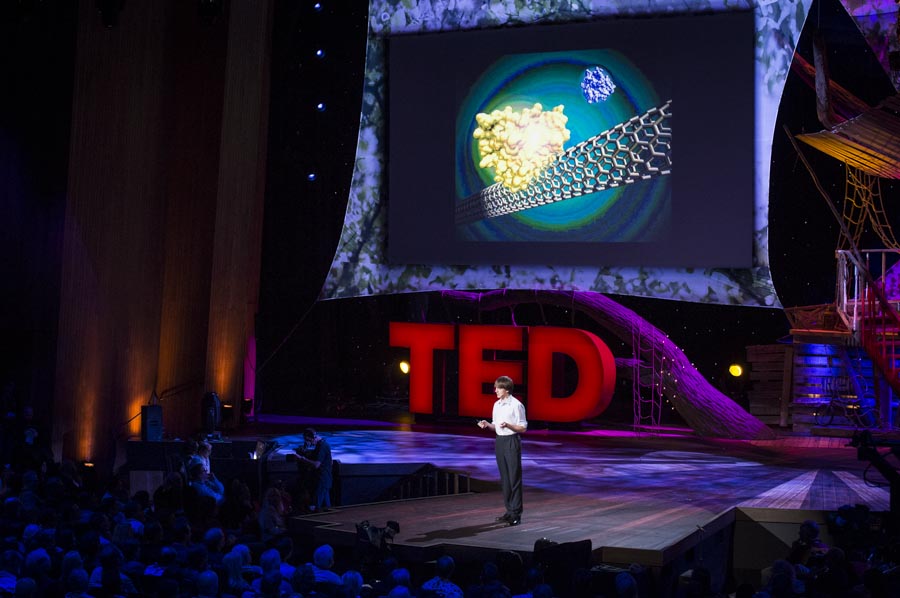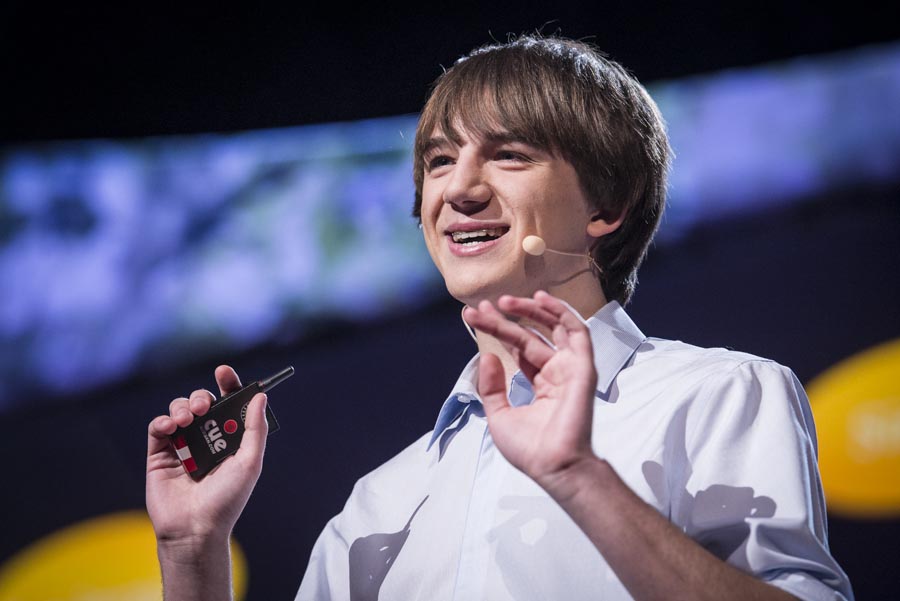When Jack Andraka was 15 years old, he didn’t know what a pancreas was. Now, this teenager has created a test for the early detection of pancreatic cancer that, while still in the preliminary stages, looks promising. So how did he become an health innovator?
Andraka tells the story during Session 6 of TED2013.
“Have you ever experienced a moment in your life that was so painful and confusing, you just want to learn everything you can to make sense of it all?” he asks.
For him, that moment came when a family friend, who’d been like an uncle to him, passed away from pancreatic cancer. In Andraka’s Googling, he discovered startling statistics about this kind of cancer — that in 85% of cases, pancreatic cancer is diagnosed late when a person only has a 2% chance of survival. As Andraka explains on the stage, this is because the same (very expensive) pancreatic cancer test has been used for decades, and is only given if a doctor already suspects you have the disease.
“It’s a 60-year-old technique — that’s older than my dad,” says Andraka.
Andraka set out to develop a new test for pancreatic cancer that’s inexpensive, rapid, simple, sensitive, selective and minimally invasive. He began by looking for a protein in the bloodstream that would be a biomarker for pancreatic cancer — one that would be found in all cases, even in the earliest stages. The problem: there were 8,000 possible proteins. When Andraka was “close to losing sanity on the 4,000 protein,” he finally found one that could work — mesothelin.
But then he found a whole new problem — how would he go about detecting it?
“My inspiration came from the most unlikely place for innovation — high school biology class, that absolute stifler of innovation,” says Andraka, to big laughs from the audience.
 While studying carbon nanotubes, Andraka had a flash of insight — that he could lace antibodies to these nanotubes so that they would react to mesothelin. This gave him the idea to make his cancer sensor out of paper. While he swears that doing this was “as easy as making chocolate chip cookies,” he realized that he needed to find a lab in which to do his work. “I can’t really do cancer research on my kitchen countertop,” says Andraka. “My mom doesn’t like that.”
While studying carbon nanotubes, Andraka had a flash of insight — that he could lace antibodies to these nanotubes so that they would react to mesothelin. This gave him the idea to make his cancer sensor out of paper. While he swears that doing this was “as easy as making chocolate chip cookies,” he realized that he needed to find a lab in which to do his work. “I can’t really do cancer research on my kitchen countertop,” says Andraka. “My mom doesn’t like that.”
Andraka wrote to 200 scientists asking for space in their lab. He received 199 rejections. And even at the one lab at Johns Hopkins University where a professor was willing to entertain his theory, he was bombarded with questions from grad students trying to sink his procedure. Andraka realized that his method did indeed have blank spots.
“Over the course of the next months, I painstakingly filled all those holes,” he says.
In the end, Andraka has created a paper censor that costs 3 cents — about 26,000 times less expensive than the current pancreatic test. The test takes five minutes. And it appears to have close to 100% accuracy, potentially allowing pancreatic cancer to be detected in its early stages, when a person has a much better prognosis. This accomplishment not only made Andraka the winner of the Intel International Science Fair — it has the potential to save many lives.
Even better, Andraka thinks it could potentially be used to test for ovarian and lung cancer too. And by switching out the protein the test reacts to, it could — down the road — be used for diseases as varied as heart disease and HIV/AIDS.
“Thorough this journey, I’ve learned an important lesson — that anything is possible with the internet,” says Andraka. “You don’t have to be a professor with multiple degrees to have your idea work.”
Read the TED Blog’s Q&A with Andraka.
Jack Andraka’s talk is now available for viewing. Watch it on TED.com »

Comments (40)
Pingback: Education: Remember the Cavemen (Part 1) | Brad Keywell
Pingback: June 11 Chat – Open mike with Jack Andraka | hcldr
Pingback: Thinking Digital - Rational Optimistm - Eaglewood.nl
Pingback: Study shows Organics Healthier than Conventional Foods | Primal Grounds
Pingback: Mesothelin: An early detection biomarker for cancer (By Jack Andraka) | Pharmaceutical Intelligence
Pingback: Micro-experts and the specialization economy | Purpose Driven Startup
Pingback: Jack Andraka | Just Kids, Huh?
Pingback: Amerikaanse tiener ontwikkelt betaalbare test voor alvleesklierkanker | Gezondheidskrant.nl
Pingback: HUM- Current Events 2/4/13 | 18JuliL
Pingback: Cure for Cancer
Pingback: Prodígios mostram invenções nas áreas de saúde e ciência | Escola de Criatividade
Pingback: How To Keep On Keeping On When You’re Doing Everything You Can And Nothing’s Happening : Game Plan for Productivity + Peak Performance + Mental Toughness Under Pressure
Pingback: Michael K. Powell: The TED of All Things - Freshwadda Brooks | Coming Soon!
Pingback: 15 year old Creates Better Test for Pancreatic Cancer | The TGB Report
Pingback: What We’re Reading | Red Sky Public Relations
Pingback: Juventud e investigación española ante el cáncer de páncreas » Agibilis | Agibilis
Pingback: An explosion of interesting things | aaronscottkroh
Pingback: Wizmo Blog » Blog Archive » An early detection test for pancreatic cancer: Jack Andraka at TED2013